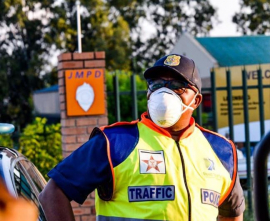
As South Africa commences with the phased rollout of the Administrative Adjudication of Road Traffic Offences (AARTO) Act, Minister of Transport Fikile Mbalula has emphasised that the legislation has been introduced to save lives on the roads.
“We have made a commitment to arresting the carnage on our roads and committed to re-imagine our approach to road safety and making sure our people arrive alive when using our roads,” the Minister said on Thursday.
Addressing members of the media on the progress made of the rollout of the Act, the Minister said the legislation will be implemented in phases, with the first phase of the rollout running from 01 July 2021 to 30 September 2021.
Government has over the medium term, allocated R545 million to the Road Traffic Infringement Agency (RTIA) to fund the rollout of the Act. Of that entire amount, R215 million has been allocated for the current financial year.
“….The national rollout means the entire AARTO Amendment Act 4 of 2019 with regulations is now incrementally being put in force in a phased approach that will culminate with the Points Demerit System. The impact of the points demerit system embedded in the AARTO process is such that there will be an allocation of demerit points for specific transgressions committed by infringers on our roads,” Mbalula said.
The system will be objective and fair in identifying reckless drivers and transgressors on the road.
“Similarly, common penalties are being introduced for all traffic violations throughout the country and will carry the same penal values. Electronic service will begin in earnest, which means that law enforcement can be effectively supported by technology, servicing documents by electronic means, such as e-mail,” the Minister said.
In addition, infringers can exercise their elective options accompanied by the introduction of the Independent Appeals Tribunal, where they can appeal against the rulings of the Road Traffic Infringement Agency (RTIA) to the tribunal where such representations were not successful.
The AARTO rollout also ensures that infringers do not burden the courts with some of the infringements.
“This also sees the introduction of driver rehabilitation programmes for habitual infringers, where infringers who have their licences cancelled can attend rehabilitation programmes before being allowed back in the driving fold. This shows that the AARTO is not just about punishment but has intentions to ensure compliance and change of road user behavior,” the Minister said.
In order to sensitise the public to the changes brought by this AARTO legislation, the public will be educated on the manner in which this law will impact road users.
“It is therefore, deemed prudent that this rollout be introduced in phases to ensure that all metros and local municipalities fully adhere to the legislation with lessons learnt from the operational jurisdictions of Johannesburg and Tshwane used as a yard stick for maximum impact,” Mbalula said.
Phased approach
The first phase is intended to increase the footprint of the RTIA nationally, through seven AARTO service outlets and online services such as the AARTO website and the AARTO mobile application.
“These service outlets will allow the public to exercise their AARTO elective options especially those in rural communities. Issuing authorities in all provinces will be in a position to facilitate access to the elective options and give the public the ability to pay for their infringements anywhere in the country.
“This phase will be accompanied by aggressive public awareness and education campaigns to ensure that all road users are empowered with AARTO education in a language they can understand,” the Minister said.
The second phase of the rollout will commence from 01 October 2021 to 31 December 2021 as per the proclamation of the AARTO Act 46, of 1998 as amended, which will see 67 local and metropolitan municipal areas coming online with the AARTO process.
“The Adjudication Process and Appeals Tribunal will be set in motion to assist infringers resolve their traffic infringements with ease without burdening the courts of law. If an alleged infringer is not in agreement with the adjudication results, they can approach the independent Appeals Tribunal as a recourse in the administrative justice process,” the Minister said.
This will reduce the burden on the courts and decriminalise traffic infringements.
“This will be adopted to ensure a seamless transition, further enhanced with the coming online of another 18 AARTO service outlets with intensified public awareness and education campaigns,” the Minister said.
The third phase will run from 01 January 2022 to 30 June 2022. This phase will be characterised by the coming on board of the remaining 144 local municipal areas as proclaimed.
The fourth phase will wrap up the entire implementation of AARTO in 01 July 2022 when the Points Demerit System and Driver Rehabilitation Programmes will be introduced.
“By the time we reach this milestone, there will be no excuse among our road users that they do not understand the implications and consequences of the AARTO process. Schedule 3 of the AARTO Regulations will provide for a comprehensive list of demerit points allocated for every identified infringement or offence.
“The threshold level of demerit points is 15 points. Upon exceeding the threshold mark, one’s driving license gets suspended for a period of three months for every point that the threshold has been exceeded. The reduction is one point for every three months that a motorist remains violation-free,” the Minister said.
The Act is set to reduce the high rate of non-compliance to traffic laws and to inculcate a new habit of voluntary compliance to road traffic laws. – SAnews.gov.za


